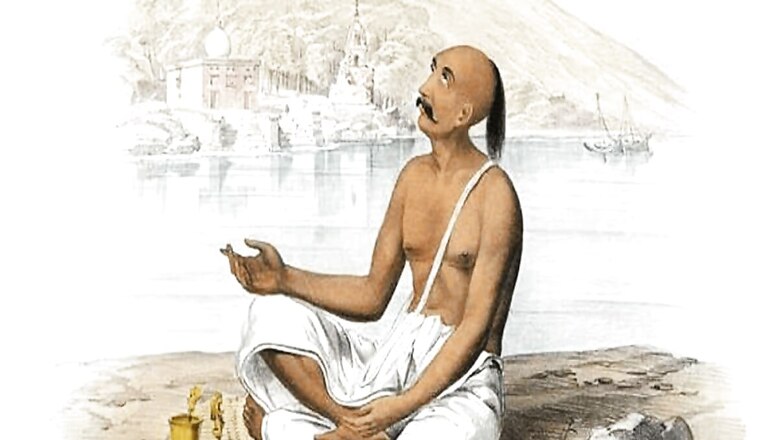
views
Bishop Robert Caldwell’s phoney equation that Brahmins=Aryas=evil north Indian invaders=oppressors of Dravidians was based on dubious linguistic studies in Tamil and Sanskrit, which had no real basis in either history or linguistics. Among other scholars, the late Prof R. Nagaswamy, in recent times, has convincingly demolished Caldwell’s serial scholarly misdemeanours in his ‘Studies in Ancient Tamil and Society’, ‘Dharma Yoga’ and ‘Tamil Nadu: The Land of Vedas’.
Robert Caldwell’s missionary-agenda-driven scholarship operated on multiple layers. One of the first outcomes of his “linguistics studies” was to deny the verifiable historical truth that the Tamil language was derived from Sanskrit. In fact, he went so far as to claim the opposite: he brazenly posited that the Sanskrit language had “borrowed” from Tamil.
In polite terms, this is how he put it: “Sanskrit has not disdained to borrow from its Dravidian neighbours…Tamil, the most highly cultivated ab intra of all Dravidian idioms can dispense with its Sanskrit…and not only stand alone, but flourish, without its aid…a Tamil poetical composition is regarded as…classical, not in proportion to the amount of Sanskrit it contains…but in proportion to its freedom from Sanskrit.”
Caldwell’s specious treatise was quickly picked up by the then Governor of Madras, the unapologetic racist, Mountstuart Elphinstone Grant Duff—author of a highly disparaging “history” of the Marathas. In an audacious public address to the graduating students of the Madras University in 1886—three-fourths of whom were Brahmins—Duff launched a frontal assault against the entire Brahmin community of south India, declaring that “Brahmins are the real usurpers of social and literary superiority.” In today’s idiom, this qualifies as hate speech against Brahmins.
Next, Grant Duff pointed to the non-Brahmin graduates in the audience and thundered as follows: “You are of pure Dravidian race…I should like to see the pre-Sanskrit element amongst you asserting itself rather more…The constant putting forward of Sanskrit literature as if it were pre-eminently Indian, should stir the national pride of some of you Tamil, Telugu, Cannarese [Kannada]. You have less to do with Sanskrit than we English have. Ruffianly Europeans have sometimes been known to speak of natives of India as ‘Niggers,’ but they do not, like the proud speakers or writers of Sanskrit, speak of the people of the South as legions of monkeys. It was these Sanskrit speakers, not Europeans, who lumped up the Southern races as Rakshusas—demons. It was they who deliberately grounded all social distinctions on Varna, Colour.”
Three conclusions immediately follow from Grant Duff’s hate speech against Brahmins. The first is the fact that he built upon Robert Caldwell’s original anti-Brahmin harangue just eleven years after it was published. The second is his diabolical claim of a separate “national pride” of the “Dravidians.” Needless, this is the original template, whose current variant is an alleged “pure Dravidian stock,” a stock phrase that the DMK politicians and ideologues throw around with impunity. The third is Duff’s portrayal of colonial British imperialism as a regime that was “benevolent” towards the “pure Dravidian race.” In hindsight, the debt that large parts of south India owe to the enlightened Princely States like Mysore and Travancore is quite profound and cannot be repaid. These states acted as extraordinary, sturdy bulwarks that largely prevented the poisonous Dravidian narrative virus from infecting their own domains.
Clearly, Grant Duff’s speech was sweet music to the ears of the nascent Dravidianists at the turn of the 20th century. Within a decade, there was an explosion of various Tamil sangams (associations) across the Tamil land, the most famous of which was at Madurai. It was lavishly funded by Pandithurai Thevar, a prosperous zamindar of Palavanatham. He established something called the Fourth Tamil Sangam in Madurai with the explicit objective of restoring rare Tamil texts and became a great patron of the Tamil language and literary scholarship. The Fourth Tamil Sangam began publishing a new journal named Sen Tamil under the general editorship of V. Swaminatha Iyer.
Pandithurai Thevar’s rock-solid commitment and service to the world of Tamil language and literature is truly a chapter etched in gold. However, there was no way that Thevar or the vast army of scholars he had engaged could foresee the manner in which their efforts would be hijacked so horribly.
Thus, what began as an earnest and heartfelt endeavour at rediscovering a “pure” and “independent” Tamil heritage and culture, morphed into linguistic zealotry at the end of the first decade of the last century. Ably aided by the Aryan Invasion fantasy, the notion of a separate Dravidian/Tamil identity, culture and language took incredibly strong roots in the minds of even honest scholars of both Sanskrit and Tamil. Those who refused to take part in this grand bluff were either marginalised or cowed down into brute submission by the fast-emerging band of brainwashed Dravidian hoodlums.
A stark, real-life instance of how this ideological rowdyism played out provides a representative illustration. F.R. Hemingway, author of Tanjore Gazetteer, gives a picturesque description of the cultural landscape of Thanjavur in 1906: “Almost every village has its temple to one of the orthodox gods, holy places are legion… where ascetics may find shelter and in which are held discussions by the erudite on disputed points of doctrine or ritual… Brahmans versed in the sacred law are numerous in Tanjore; Vedic sacrifices are performed on the banks of its streams; Vedic chanting is performed in a manner rarely rivalled; philosophical treatises are published in Sanskrit verse; and religious associations exist, the privilege of initiation into which is eagerly sought for and the rules of which are earnestly followed even to the extent of relinquishing the world.”
This would soon be a thing of the past.
To be continued
The author is the founder and chief editor, The Dharma Dispatch. Views expressed in the above piece are personal and solely that of the author. They do not necessarily reflect News18’s views.














Comments
0 comment